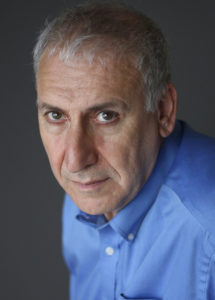
Edward Hirsch ’72 returned to campus last weekend as an athletic hall of fame inductee. The S&B’s Jackson Schulte caught up with Hirsch to talk about poetry and life at Grinnell.
S&B: Does it feel strange, after getting all this recognition as a poet, to be back at Grinnell as an athlete?
EH: I think it’s kind of sweet to be back here as an athlete. My high school football coach is the one who found out about Grinnell for me. I was in Chicago and he said, “I want to find a school where a freaky kid like you can play football.” And it turns out he was right, and it was a very strange path, but everyone here was wildly enthusiastic about the idea of playing football and baseball and being a poet. That’s not something I took for granted, I had a lot of clashes with football types in other places, and they weren’t so receptive. I knew I wasn’t going to be a professional football player. I loved playing sports here but my vocation is what I found here, and that was for poetry.
S&B: Did you decide you wanted to be a poet when you were at Grinnell?
EH: I did. I started writing poetry when I was in high school pretty much the way everyone does. You have feelings and you don’t know what to do with them, so you start writing poetry, and I liked the way it made me feel. But when I was a freshman here I brought my poems to my freshman humanities teacher, whose name was Carol Parssinen ’63 [English]. She taught me something really remarkable. She said, “You could be a poet. You have the imagination, you have the passion, but what you’re writing is not poetry. You’re just writing down your feelings and you’re not making anything. And you haven’t read anything.” So, I started to read poetry and I started to imitate who I was reading.
S&B: Who were you reading at Grinnell?
EH: I was reading everybody, but the poet who had a tremendous impact on me was a poet named Gerard Manley Hopkins, a Victorian poet. I was looking at a poem of his, which I read one night in Loose Hall, and it was just a desolate poem which begins “I wake and feel the fell of dark, not day.” It’s one of the so-called “terrible sonnets.” It just spoke to me very deeply, but when I looked at it more closely I said, “Holy shit, this thing is a sonnet, and he actually made this thing. He crafted it.” So I started to try and craft my own poems, and from that moment I started to become a poet and not just a person who was writing poems. That was my freshman year, and my sophomore year I decided I had a calling for this. I knew that this was going to be my life.
S&B: Elaborating on what you were reading at Grinnell, were there certain authors that you and your friends were talking about while you were here?
EH: First of all, there was no modern poetry class here. I had a very good classical education, but everything I read and that my friends read, I did on my own. At the time I was sort of resentful about it, but later I came to see that it was an advantage, because we came to read everything our professors didn’t know about. I used to haunt the library and the Grinnell bookstore, and sometime my junior year, I started to read poetry in translation. I was reading Robert Lowell and Elizabeth Bishop. I was reading T.S. Eliot and William Carlos Williams, all the modernists, and I was reading romantic poetry in the English classes. But the great discovery for me was when I began to hear things in other languages translated into English. I discovered Spanish, Latin American surrealists like Pablo Neruda and Garcia Lorca and Miguel Hernandez. And I discovered these Eastern European poets like Czeslaw Milosz and Zbigniew Herbert. I liked their combination of passion and intellect, and those became models for me. So, I became a sort of devoted internationalist.
S&B: You were quoted in an Atlantic piece titled “How Poetry Came to Matter Again,” which talks about the increase in poetry readership among younger Americans. The poets they say sparked this renaissance are largely writers of color and writers who come from immigrant families. How do you think that happened?
EH: Well, I think it’s a historical correction. What they quoted in the piece is from an essay I wrote when I edited “The Best American Poetry” in 2016, and it’s about the reclaiming of the “democratic I.” What I’m arguing is that “the I” had been ruled out of poetry by postmodernists, by extreme irony, and in a way that cut off people’s experiences. And the reclamation of people’s experiences and what actually happened to them had been prematurely cut off. This response of people from different communities now using the “democratic I” restores something important in American poetry which is premodern, which is Whitmanian.
S&B: Do you still follow football or baseball?
EH: Because I grew up in Chicago, I was wildly enthusiastic when the Cubs won the World Series. I was in Mexico, and I was watching Game 7 with a group of Mexican poets who knew nothing about baseball, but I was wildly enthusiastic. I’m not a tremendous fan of watching football. The violence is troubling to me. I loved to play, and I read the paper every day but I’m not a tremendous fan.


































































